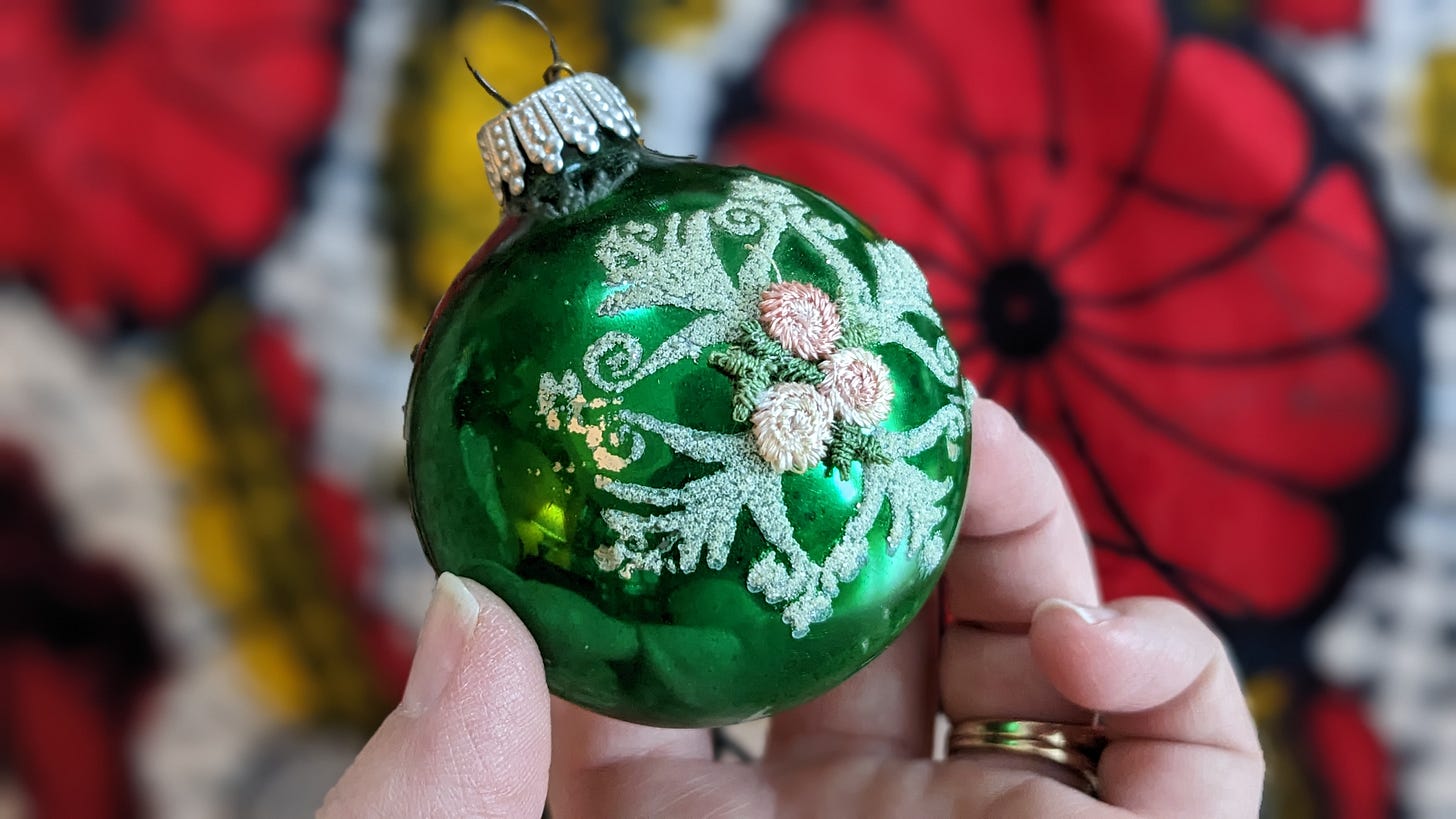Some of my two dozen or so Christmas ornaments are from before my family went to Africa, some were made in Africa, and some are from the time after I stopped traveling internationally and became a person who holds a previous, utterly different life packed in a box deep in her heart. There’s one for each year until I left home, plus a few extra.
I have only a few tangible remnants of my childhood in Liberia, West Africa. A couple of items of clothing, a tablecloth or two, my old flute, some photos, and my World Health Organization yellow card. And I have my Christmas ornaments. The ornaments bridge all the islands of my continent-spanning, culture-twisting childhood.
Here in the United States, living a life I love, I can easily forget the city I grew up in was destroyed by war. The Lutheran church I attended as a child became a slaughterhouse several months after we left Monrovia, with over 600 people killed there, refugees who had fled from the fighting elsewhere in the city. My Christmas ornaments obligate me to remember that the innocence I grew up with, the belief that brutal ethnic violence just doesn’t happen in Liberia, was shattered like a vintage glass ball falling on a tile floor. It is an awful lot of weight for a small glass ball to carry.
When the Christmas ornaments come out, I ache for this place in time that is no more. I have often decorated my Christmas tree while crying. Some years I have avoided decorating the tree until my guilt at procrastinating over the decorating shames me into action. I’ve had spells of inexplicable rage come tumbling out of the cookie tins that all my ornaments are stored in as I unpack them for decorating.
I want you to know that grief often wears masks and only sometimes looks like honest tears into a pillow. Grief isn’t a Hallmark movie.
Several years ago, fed up with Christmas in general, I flatly abandoned the idea Christmas is supposed to be glowing and magical. I’m not the only one; a lot of people experience grief of all kinds at Christmas. Most often we think of obvious losses, like the family whose college-aged son was killed in a tragic accident abroad, an unexpected layoff, or an impending divorce. The truth is, though, in the darkness of winter, in the midst of an almost cultish societal demand to “feel the spirit of the season,” most people feel loss and sorrow of some kind or another. And we feel guilty when we can’t share the joy.
I want you to know that grief often wears masks and only sometimes looks like honest tears into a pillow. Grief isn’t a Hallmark movie.
Ambiguous loss can hit awfully hard because it’s often invisible. Your dad is still here and you know you should be thankful for another Christmas with him, but he’s not himself; he’s opening the grandkids’ gifts on the sly and sticking his fingers in the Christmas cake. Remembering him reading Luke 2 to you as a child hurts; you’re not sure he even knows what the Bible is anymore.
Surrounded by kids screeching with delight at the holiday light display, your arms ache for what you’re becoming resigned to never having: a child of your own to experience Christmas with. You avoid walking past the children’s clothing section with its fleecy striped Christmas onesies because the cuteness hurts.
Your daughter married a pastor and now can’t be home at Christmas. Financial woes and inflation mean you can’t bake the fruit and nut-laden Christmas treats you grew up with. Your father-in-law’s cancer diagnosis means the pressure is mounting to make his last Christmas perfect and your mother-in-law is becoming insufferable.
This is the natural way for our earthly Christmases on this broken, wounded planet, although nobody talks about it enough. While we ache and struggle, the retail stores blather on about hope as the “true meaning of Christmas,” without defining in Whom we are to find that hope. Even in the church, we face pressure to smile, to force a feeling of joy, and to pretend that the children’s singing made everything okay when all we really want to do is lie on the cold floor in front of the altar in a dark sanctuary and weep until we choke.
It can feel like everyone is intent on denying that the Christ Child had any reason to come and save us from anything.
This is the natural way for our earthly Christmases on this broken, wounded planet, although nobody talks about it enough.
Our grief-stained Christmases aren’t unique, though. A woman, deeply pregnant, forced to travel by a godless government’s desire for a census, giving birth away from home, with a goat for a midwife. And later, the small Christchild and his parents make a desperate escape out of the country, fleeing a jealous and murderous local official. How, to use a word we know so well, stressed Mary and Joseph must have been. Possibly even terrified, despite knowing God was literally with them there in Mary’s arms. Then, they were broken further by learning of the slaughter of every boy under the age of two. Both Mary and Joseph were ordinary humans, just like us; how they must have wept for their friends and relatives. Every male baby and toddler, dead. Can you imagine the grief?
“A voice was heard in Ramah, weeping and loud lamentation, Rachel weeping for her children; she refused to be comforted, because they are no more.” -Matt 2:18
In the midst of sorrow and survival, Mary and Joseph took comfort in Who their little baby was: the Light that the darkness cannot overcome. So do we, even as we tumble, exhausted and grieving into Christmas Eve, hoping nobody can tell that we were sobbing on the way to church. Blessed be our pain, for into our woundedness comes the Christ, drying our tears on His robe and holding our shaking shoulders. After our skin has been thus destroyed, yet in our flesh shall we see God. Amen.
Liturgy For A Dark December
Be gracious to me, O Lord, for I am languishing. My soul is also greatly troubled. The light shines in the darkness, and the darkness has not overcome it. My strength is dried up like a potsherd, you lay me in the dust of death. For he knows our frame; he remembers that we are dust. I cry in the daytime; at night, I can’t sleep. The wild beasts will honor me, the jackals and the ostriches, for I give water in the wilderness, rivers in the desert, to give drink to my chosen people. The wind passes over me and I am gone; my place knows me no more. I will come again and take you to myself, that where I am you may be also. The floods have lifted up, O Lord. The waves of the sea are mighty and rage horribly. He made the storm be still, and the waves of the sea were hushed. Then they were glad that the waters were quiet, and he brought them to their desired haven. Turn Yourself to me, and have mercy on me, for I am desolate and afflicted. The troubles of my heart have enlarged; bring me out of my distresses. Man and beast you save, O Lord. How precious is your steadfast love, O God! The children of mankind take refuge in the shadow of your wings. When the Lord restored the fortunes of Zion, we were like those who dream. Then our mouth was filled with laughter, and our tongue with shouts of joy. He who goes out weeping, bearing the seed for sowing, shall come home with shouts of joy, bringing his sheaves with him. Depart from me, all you workers of evil, for the Lord has heard the sound of my weeping. The Lord has heard my plea; the Lord accepts my prayer.
Selected verses of Psalms 6, 22, 25, 36, 93, 103, 107, and 126, John 1 and 14, and Isaiah 43, English Standard Version. Edited by Jenny Jordan.






Oh, this is beautiful. Thank you, Jenny.
This made me shed some very necessary tears. Thank you!